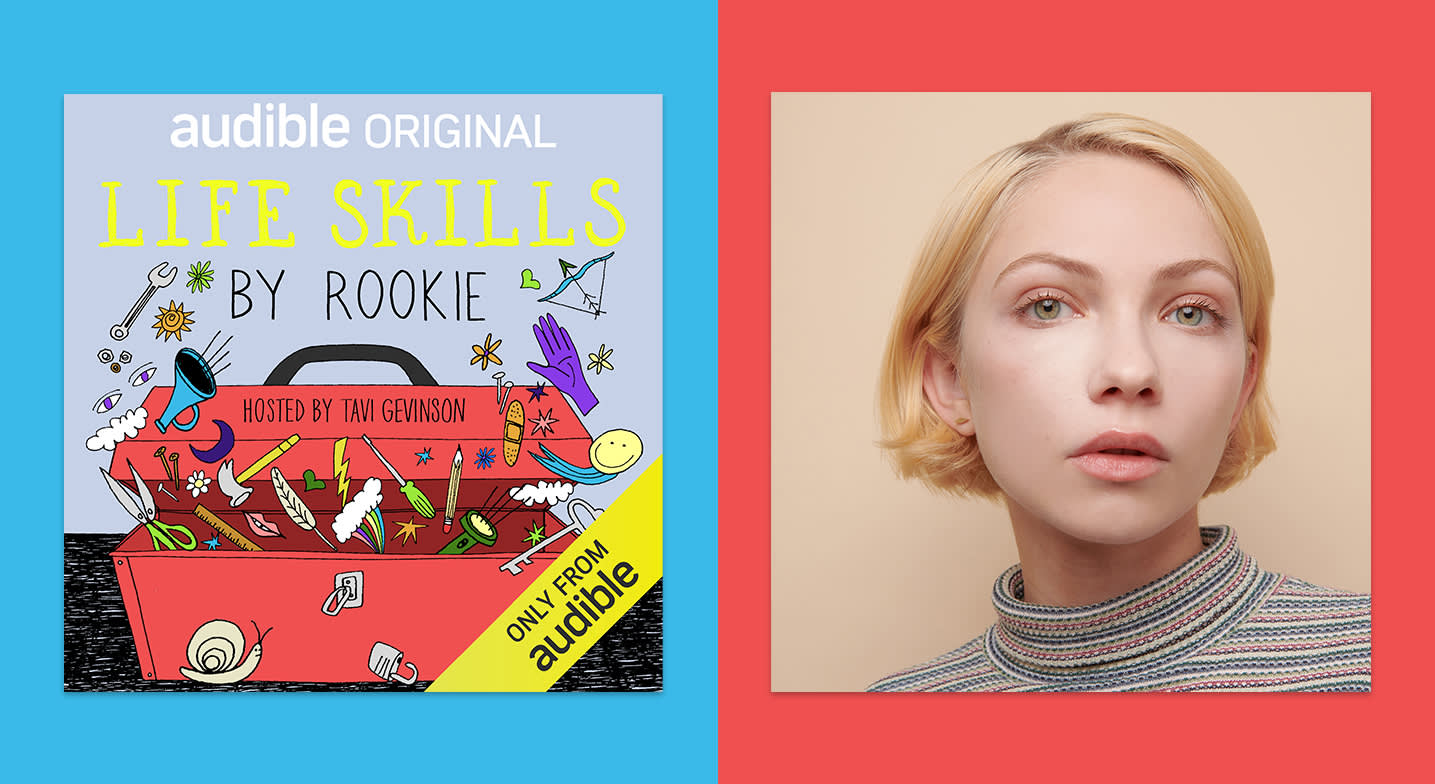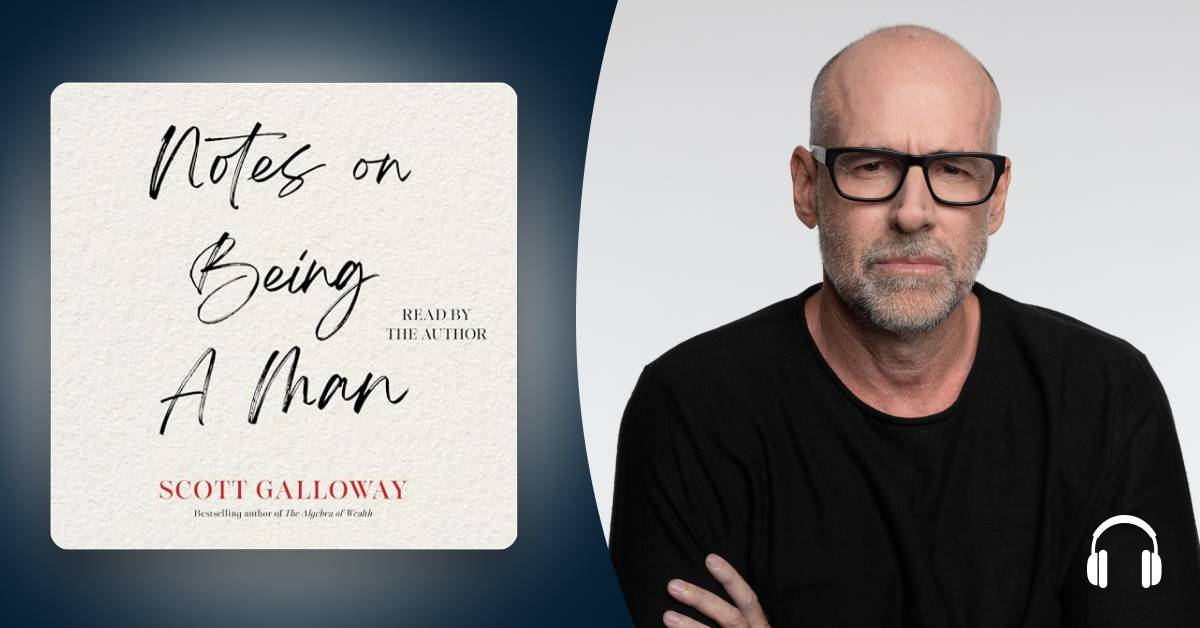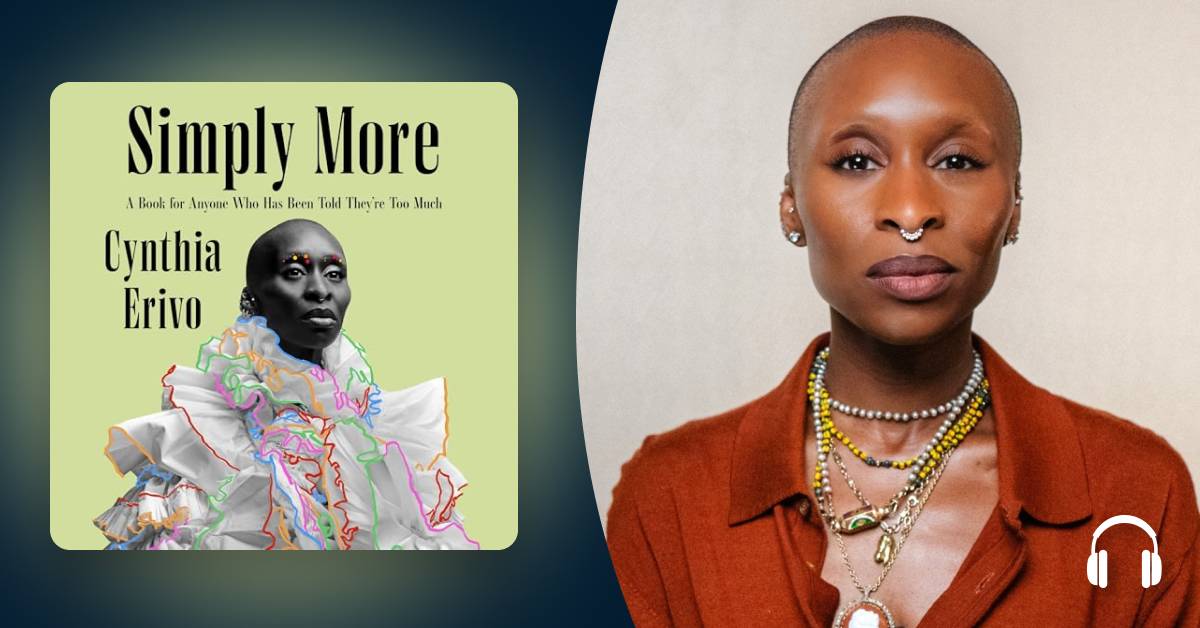Note: Text has been edited and does not match audio exactly.
Kat Johnson: Hi there. This is Audible Editor Kat Johnson, and I'm here today with Tavi Gevinson, who founded the influential fashion blog Style Rookie at the age of 11 and has not stopped since, launching the online magazine Rookie and acting on Broadway as well as in the upcoming reboot of Gossip Girl. She now hosts the new Audible Original podcast Life Skills by Rookie, and I'm so thrilled to talk to her today. Tavi, welcome. I was among the many readers who were heartbroken when Rookie folded in 2018. Tell me about how you ended up bringing it back again in this new format and what it feels like to get everybody back together.
Tavi Gevinson: Thanks, Kat. That was so nice. So Rookie folded just over two years ago, at the end of 2018. I think I started talking to Audible about a year ago and my producer there, Jessica Almon Galland, was Rookie's book editor when we published these print anthologies at Penguin, at Razorbill.
We were talking about our favorite pieces from those books, just kind of reminiscing about the pieces that felt so specifically and uniquely Rookie, that I feel like I haven't been getting from other publications or places on the internet since Rookie folded. We were talking about the column Life Skills in particular, which the writer Krista Burton wrote for us. The skills ranged from really tangible, practical things like how to beat down a door, if you should ever need to do that, to more emotional things, like how to give a real apology. And then there was also so much advice on Rookie that fell outside of that column, and also writers published a lot of personal essays with us that also functioned as practical advice or guides to different life skills.
"You can't tell people exactly what to do, but you can give them new frameworks for thinking about things..."
So, we wanted to do a collection on audio of those kinds of pieces, and "life skills" just sort of summed it up. Around the time that I was asking writers if they wanted to participate, the shutdowns had happened. I not only really missed Rookie, but I really missed going to readings and being able to gather with people and hearing people read their work aloud.
Honestly, it just helped me a lot to be working on these with our writers over the last many months and to have community that way and to imagine the Rookie community listening to those again eventually.
KJ: It's interesting you were talking to Audible about various things you could do, and I imagine you maybe could have gone a traditional audiobook route, but I appreciate that you chose this podcast, because it feels so collaborative. I love that you brought in all of these other voices and these amazing writers that you worked with before from Rookie. I think the topics are really spot-on. There's how to manage uncertainty, how to stand up to your inner critic. I think my favorite is how to live a fabulous life. Can you tell me a little more about how you chose the topics and how you chose the writers?
TG: It started with me going back through a lot of those more emotionally rooted guides and how-tos that were on Rookie, and contacting writers who, I think, really found their sweet spot in doing that and who also I thought would know how to perform their work for audio. I asked them all to send me three or five ideas of life skills they wanted to write, because I really felt like, whatever this writer is the most passionate about, that's going to be the best piece, and then discussed it with them.
Jessica and I had a sense of topics we might want to cover or the kind of balance we would want between the more esoteric how-tos and the more tangible or practical ones, but that balance just naturally came together, because I feel like when you have really wonderful writers and performers, you just have to let them do what they're really good at and then you'll have the most specific and exciting piece.
KJ: Right. And I think their personalities and perspectives really come through, which is great. It's interesting because you ran the column Life Skills on Rookie just a few years ago, and I think of you and everything you've done as kind of inherently feminist. I grew up with Sassy magazine. I know Rookie is kind of a spiritual sister to Sassy. I feel like just in the past couple of years, the goalposts of feminism have really shifted, where the idea of the girl boss and having it all is no longer the endgame, and we're looking for something more authentic and more community-oriented and, frankly, less exhausting. Do you feel like people want different kinds of advice now than they did when you were doing the original Life Skills? Have women's questions and problems changed in any way that you noticed?
TG: I think there are some things that are just constant, like how to manage uncertainty. I was also thinking a bit about the audience being Rookie's audience, but aged up, more women in their 20s and 30s and up rather than teenagers. But it's so hard to speak generally about what different women are dealing with. I do think that working on the show over this last year, for me personally, it would be very hard to not have felt transformed by a lot of the events of this past year. Seeing institutions that I never thought would shut down, shut down, then you're kind of able to imagine the world in so many different ways.
Working on the show with these writers as all of that was happening, definitely, some of the pieces started to address capitalism more directly. I feel like maybe that was always there in the script in spirit, and that was a big part of Rookie, but this past year has just laid even more bare, if it wasn't already clear enough, how pervasive capitalist systems are, even down to the conversation you're having with yourself in a moment of total privacy. I think the episode about self-care addresses that.
The episode "Have a Little More Fabulous Life" is also about finding modes of expression that cannot be commodified at a time when you kind of could always be working, and even fun and pleasure have become forms of work or things to share and perform and capitalize on.
I do think there are two things happening online where, on one hand, especially since Me Too, we're experiencing all of these types of behaviors that people used to never talk about, or at least not talk about as abusive or damaging or harmful, and are now being talked about. And I think with that has come a reactive delete all the toxic people from your life, protect yourself.
I definitely just took a lot of pleasure in being able to consider all these different aspects of these scripts from so many different angles with the writers and figuring out, where is it important to give an example so you can be specific and someone can recognize their own experience? Where are you more just trying to give people new ways of thinking about things? Because you can't know the details of every single person who's listening, everyone's life.
KJ: That's fascinating. You kind of answered my next question. I've actually been obsessed with advice in general since the pandemic began, because it's so visceral to me. In the beginning, I was so fragile and I was like, "I don't want advice from anyone. No one's from the future. Anyone who thinks they have all the answers is suspect." And now I'm in this place where I'm like, "Someone just tell me what to do. I just don't care." So what is your philosophy on really good advice? And without giving too much away, did you get any great advice from the podcast yourself?
TG: Oh, my God, totally. Well, I'll start with the first part. Yeah, I think I do have sort of an allergy to advice that is too prescriptive or when a writer, almost in any form, is purporting to have all the answers about something. At the same time I really love advice, and I feel like even if it's impossible to give universally applicable advice, you can still have a value system. You can still talk about what those values are and what they look like and behavior. And if that's what the listener is looking for, basically "How do I do what I want to do compassionately or thoughtfully?," if you share those values, then I think that coming from that place can just offer people... You can't tell people exactly what to do, but you can give them new frameworks for thinking about things or some of the episodes, like "How to Talk Back to Your Inner Critic" or "How to Manage Uncertainty" or "How to Be Creative if You're Scared." All of those writers kind of spell out the sorts of thoughts that get in the way of doing those things or crop up when you're trying to do those things, and just dismantle and unpack the logic behind a lot of that thinking, behind a lot of thoughts that come from anxiety or fear.
"...As a listener, I get a lot out of hearing just the humanity of someone's voice, particularly when they're reading something personal or something rooted in their own experiences..."
I really like advice where it feels like you're just walking around in someone else's mind and encountering the same kinds of traps or questions and unpacking them, and then there are things that I think are very practical, like "How to Be Good at Talking to People if You're Not Good at Talking to People," which I thought was such a helpful episode because that's one where it would be easy for Krista, the writer, to be like, "Just be yourself. Just be friendly," and that's too broad. She actually gives you a script of what you can say if you don't know what to say to someone.
KJ: I love this kind of community approach as well. I think one thing I've learned in the pandemic is instead of me just wanting to solve things for myself, I'm trying to solve things from more of a we perspective, because the more people you can find with your problem and try to solve for them too, just the more powerful you are. And I think we're realizing so many of these problems are systemic and it's not on us to get to inbox zero or bullet-journal our way to some higher level. I appreciate that you've created this community element around it, because I think that's really important.
TG: Yeah. That's really a huge part of what I missed from Rookie. It was nice to have a designated place for just talking about what's going on in the world or with ourselves and finding solutions together, whether it's with our other editors or our contributors or our readers.
KJ: You're like this ultimate Renaissance woman. You're still a fashion icon, you're killing it on Instagram, you've done acting. I'm curious what drew you to audio and how that creative process feels different for you. Does it scratch a different creative itch for you than more visual projects?
TG: Yeah. So Rookie had a podcast a few years ago, the Rookie Podcast, that I hosted, where the centerpiece of each episode was an interview usually conducted by me, sometimes by our contributors, and then we also had these shorter segments, including a much shorter version of Life Skills, and I loved interviewing people, and I found that I liked the aspect of getting these pieces from our contributors where you are directing a performance.
I really enjoyed the experience, at that time, of getting people's scripts and editing them and just thinking about the way that it's different when you're hearing something in your ear from when you're reading it on the page. And with this show, even though we had that podcast, the idea of the format of people reading their work aloud—again, kind of like a real-life reading, which Rookie had so many of—that felt different from what the podcast had been. It was, obviously, different from what you would get from just revisiting the site or revisiting our books. So it felt more intimate in a way too.
And as a listener, I get a lot out of hearing just the humanity of someone's voice, particularly when they're reading something personal or something rooted in their own experiences, which all of these pieces in one way or another are. So doing this show for Audible felt like something that Rookie had not done before, but it would be a really nice way to zero in on qualities that I think defined Rookie, and that I think we were good at. This kind of balance between work that is chatty, but well written and intentional. The balance of practical advice with more kind of questions that live in the emotional world.
KJ: I saw that it was directed by Gabra Zackman, which for an audiobook nerd, that's amazing. I love her. Did she have any good tips for you?
TG: Oh, my God. She was awesome. Yeah, for sure. Actually being on those sessions and hearing and seeing the way she talked to the writers/performers, it really made me realize how much your job as an editor, or in that case as a director, is just empowering the speaker to trust themselves, and then anything good, anything real or fun or generative or spontaneous will come of that person feeling comfortable.
And one of the most helpful things was her saying, "You don't have to go as fast as you think you do. You're going fast because you think you need to justify everything you're saying by getting to the end and proving that it was worth the listeners' time or whatever," or, "You're doing upspeak because it's a symptom of our culture and modern life and we do upspeak because we want to make sure other people are on the same page. You don't have to do that. You can be more authoritative than that."
She was just great and really encouraging, and let all of these pieces come out exactly the way they needed to.
KJ: That's delightful. I have never met her or talked to her, but that fits with how I picture her, and I'm so happy.
I cannot let you go without asking you a fashion question. How have you approached dressing during the pandemic, and what do you think the mood's going to be when we're all ready to come out again?
TG: Oh, my God. I hope people lean into glamour and maximalism. That's definitely what I will be doing. I've definitely been slowly accumulating really glamorous clothes out of some kind of yearning for a different world and then being like, "When am I gonna wear this? You will not be able to wear this for so long." So that's kind of been my style. My actual day-to-day is I am just trying to be comfortable. I've been expressing myself maybe through fun T-shirts and large earrings, but I'm definitely like, "I just want to be comfortable." I cannot wait to look glamorous and do my makeup and go somewhere and be among people and be dancing.
KJ: I will wrap it up here with a final question. Are there any new exciting projects you can share with us that you're working on?
TG: Let's see. I'm shooting the Gossip Girl reboot, which you mentioned. Speaking of missing glamour, it's been really fun and weird to get all done up for a TV show shooting in locations that are totally shut down in New York among lots of people. The show itself is really fun and it is like an actual dream job. So that comes out later this year, and I'm very excited for people to see it, mostly so I don't have to keep keeping secrets and lying to my friends about what happens in it.
I'm working on another show for Audible that is very different from this one. It's fiction. It's a romance, and that is a very wonderful escape to be writing right now. Those are two things to look out for.
KJ: Tavi, I think that's enough. I mean, you're not even… Are you even 25 yet?
TG: I will be this year.
KJ: Tavi Gevinson, thank you so much for talking to us today about the podcast Life Skills by Rookie, available now on Audible.





